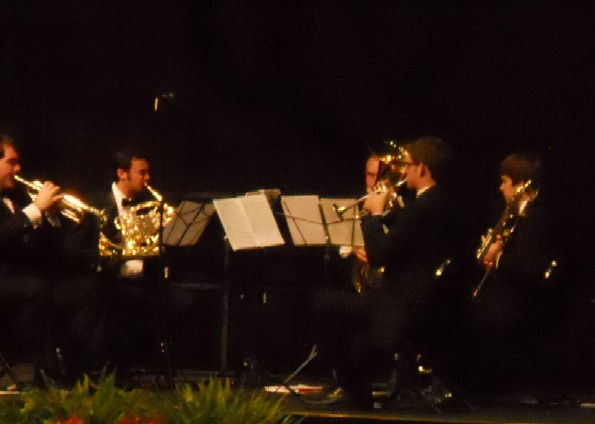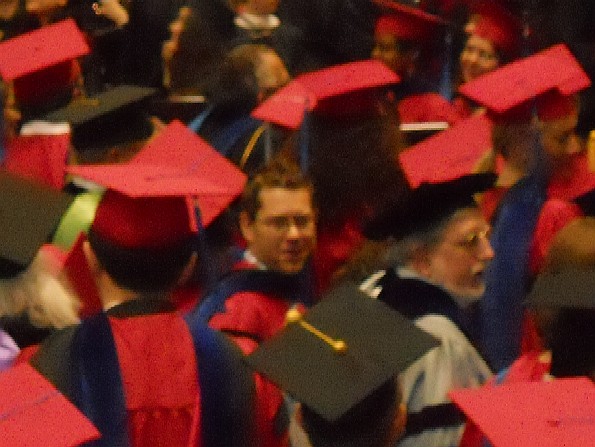
T he kind of learning that will define the 21st Century is not taking place in a classroom. Rather, it is happening all around us, everywhere. We call this the new culture of learning... a fluid infrastructure where everything is constantly creating and responding to change... This new type of learning process is a cultural phenomenon that underlies a large number of people’s experiences and affects them in myriad ways. It takes place without teachers, without classrooms, and it requires [virtual, networked] environments that are bounded yet provide complete freedom of action within those boundaries.”
— Douglas Thomas & John Seely Brown.
F arewell, the neighing steed and the shrill trump,T here is a big challenge in shaping the performance, vamping as it must for an indeterminate length of time while the procession continues.
The spirit-stirring drum, th’ear-piercing fife,
The royal banner, and all quality—
Pride, pomp, and circumstance of glorious war!”
— Shakespeare, Othello, Act III, Scene III.
T he CCM Brass Quintet did an admirable job sustaining audience interest throughout, projecting every note with the necessary dignity and authority. They varied the dynamics, softer to convey an intimate feeling while still staying audible in the large arena, louder to convey more pomp and aggrandizement. They varied the instrumentation, the round timbre of lower brass to convey a magisterial attitude, the bright timbre of high brass to convey heraldic progress.
 T he physical stamina required for what can be a very long performance is considerable, a gauntlet made all the more risky to run insofar as there are only five of you (or 4 at a time, if trumpets are alternating). The thing then amounts to a 20-min quartet or, in some passages, amounts to a trio or duet ordeal, depending on the arrangement.
T he physical stamina required for what can be a very long performance is considerable, a gauntlet made all the more risky to run insofar as there are only five of you (or 4 at a time, if trumpets are alternating). The thing then amounts to a 20-min quartet or, in some passages, amounts to a trio or duet ordeal, depending on the arrangement. W hen you are repeating and repeating the same short passage for 20+ minutes, there is a natural temptation to embark on small improvisations or decorate some figures a little. Somewhat like turning a word over and over in your mind until it looks nonsensical or silly, or until finally you wonder how the word was ever coined or came to be associated with the thing it names ... tangelo, tan-gelo, tan-ge-lo, tange-lo... t’angel-o.
T he CCM Brass Quintet played nice little fanfares throughout, for all of the graduates. But when graduates of the conservatory (CCM) approached the lectern, the Quintet’s fanfares mutated into ones that were longer by several ostentatious bars, with dilatory flourishes and a grand unpredictability… droll extra service, musicians proclaiming the specialness of other musicians, heh!
E stablishing a strong relationship with a faculty mentor is one of the most important factors in determining the success one achieves as a graduate student. Faculty members “know the ropes,” so to speak, and their guidance on research, and on professional and personal conduct, can be invaluable. Typically, a faculty mentor is someone whose research interests are similar to those of the student. As such, the mentor can be an excellent source for ideas and can serve as an informed reviewer of and advocate for the student’s work.
F or those who have succeeded in establishing a strong relationship with a faculty mentor, the prospect of that relationship changing—or becoming more distant—contributes to the tumult of emotions that well-up during the graduation ceremony. Well, not to worry, usually moving away and the resulting absence make the hearts grow stronger. They will remember you fondly, more fondly than when you were slaving away, nearly for free, in their face everyday.
F or those whose mentors’ neuroses aligned in perfectly perverse way with the mentees’ neuroses, graduation may feel like a long, badly-written fugue has concluded. Begin your next Prelude, ASAP, with Pomp and Circumstance marches played by brass quintet:
- March No. 1 in D (1901)
- March No. 2 in A minor (1901)
- March No. 3 in C minor (1904)
- March No. 4 in G (1907)
- March No. 5 in C (1930)
- March No. 6 in G minor

- Paul K. Elgar Op. 39 No. 1 Trio, arr. for brass quintet. Score at Sibelius.
- Gale J. Elgar Op. 39 No. 1 Trio, arr. for brass quintet. Score at SheetMusicPlus.
- Frederick P. Elgar Op. 39 No. 1 Trio, arr. for brass quintet. Score at SheetMusicPlus.
- Marlatt D. Elgar Op. 39 No. 1 Trio, arr. for brass quintet. Score at SheetMusicPlus.
- Elgar E. Pomp & Circumstance Marches (score). Dover, 1992.
- InstituteofPlay.org
- Wind/Brass/Perc Ensembles at UC
- Pomp and Circumstance page at Wikipedia
- Abrams B, ed. Edward Elgar and His World (Bard Music Festival). Princeton Univ, 2007.
- Arum R, Roksa J. Academically Adrift. Univ Chicago, 2011.
- Astin A, Astin H, Lindholm J. Cultivating the Spirit: How College Can Enhance Students’ Inner Lives. Jossey-Bass, 2010.
- Bain K. What the Best College Teachers Do. Harvard Univ, 2004.
- Barkley E. Student Engagement Techniques. Jossey-Bass, 2009.
- Elgar E. Letters and Other Writings. Hyperion, 1980.
- Filene P. The Joy of Teaching: A Practical Guide for New College Instructors. Univ North Carolina, 2005.
- Kennedy M. Portrait of Elgar. 3e. Oxford Univ, 1993.
- Kenyon N. Elgar: An Anniversary Portrait. Continuum, 2008.
- McVeagh D. Elgar the Music Maker. Boydell, 2007.
- Moore J, ed. Edward Elgar, The Windflower Letters: Correspondence with Alice Caroline Stuart Wortley and her Family. Oxford Univ, 1989.
- Moore J, ed. Edward Elgar: Letters of a Lifetime. Oxford Univ, 1991.
- Palmer P, et al. The Heart of Higher Education: A Call to Renewal. Jossey-Bass, 2010.
- Professor X. In the Basement of the Ivory Tower. Viking, 2011.
- Thomas D, Brown J. A New Culture of Learning: Cultivating the Imagination for a World of Constant Change. CreateSpace, 2011.
- Wildavsky B, Kelly A, Carey K, eds. Reinventing Higher Education: The Promise of Innovation. Harvard Univ, 2011.
Elgar Chamber Music:
- Romance for violin and piano, Op. 1 (1878)
- Salut d’Amour for violin and piano, Op. 12 (1888)
- Chanson de Nuit and Chanson de Matin for violin and piano, Op. 15 Nos. 1 and 2 (1897/1899).
- Violin Sonata in E minor, Op. 82 (1918)
- String Quartet in E minor, Op. 83 (1918)
- Piano Quintet in A minor, Op. 84 (1918–1919)
- Concert Allegro, piano, Op. 46 (1901)
- Organ Sonata in G, Op. 28 ()
No comments:
Post a Comment